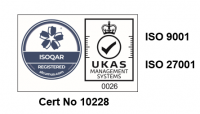Balancing Privacy and Security: Ethical Challenges in Pre-Employment Checks
February 19th, 2025 by Daisy Birch
In the ever-evolving landscape of recruitment, pre-employment screening has become a foundation for businesses seeking to build a reliable workforce and foster trust. However, as the scope and depth of these checks expand, so too do the ethical challenges they present. Striking a balance between thorough vetting and safeguarding candidate privacy requires careful navigation of both legal frameworks and ethical considerations.
The Importance of Robust Pre-Employment Checks
As the investment, time and resources required to find and keep talented employees increases, many organisations are turning to screening checks to get it right first time. This includes making sure the candidate has a seamless on-boarding experience. By verifying identity, employment history, and conducting criminal record checks, employers can also reduce the risk of fraud, and ensure regulatory standards such as BPSS and BS7858 are met.
In crucial industries such as healthcare, finance, and education, the need for meticulous checks is paramount. Here, the integrity of the workforce directly impacts public safety and organisational credibility. As such, pre-employment checks serve as a vital first line of defence in building resilient and ethical organisations.
Find out how DDC can assist with pre-employment screening.
Ethical Considerations in Pre-Employment Screening

While the benefits of pre-employment checks are undeniable, they must be balanced against the ethical imperative to respect candidate privacy. How much does an employer need to know , to suitably asses the applicant’s ability to do the role on offer? Handling sensitive information—such as criminal records, credit histories, and personal references—requires stringent safeguards to prevent misuse, bias, and unauthorised access.
- Transparency and Consent: One of the key ethical considerations is ensuring candidates are fully informed about what check you will undertake. Obtaining explicit consent is not just a legal requirement but an ethical obligation. It is the first line of defence against fraud also your first chance to let your candidates know how much your business values security and compliance.
2. Minimising Intrusiveness: Employers must evaluate the necessity and relevance of the information they seek. Screening should focus on data that is directly pertinent to the role, avoiding overly invasive inquiries that may undermine candidate dignity and privacy. Under the DBS regulations, knowingly requesting a higher-level check than the legislation allows is unlawful and could be a breach of the Data Protection Act 2018.
3. Equality and Non-Discrimination: Ethical screening should be free from bias. Employers must ensure that all candidates undergo the same checks, regardless of nationality, race, or ethnicity, to comply with UK employment law. Additionally, recruitment policies should not mandate specific right-to-work verification methods that may exclude certain applicants.
How DDC Can Help Your Organisation
Partnering with a third-party provider like DDC ensures fair, unbiased, and legally compliant pre-employment checks. Services such as criminal record checks, social media screening, and identity verification help streamline processes, reduce human error, and enhance compliance.
Using DDC’s fully compliant screening services, organisations can seamlessly integrate ethical background checks into their hiring process while staying 100% compliant with UK legislation. This not only mitigates risks but also reinforces a culture of fairness and transparency in recruitment.
Ask the Experts
If you require a bespoke pre-employment package our online platform is designed to be flexible to match your requirement. If you have any questions please contact one of the team on 0845 644 3298 or 0116 260 3055





